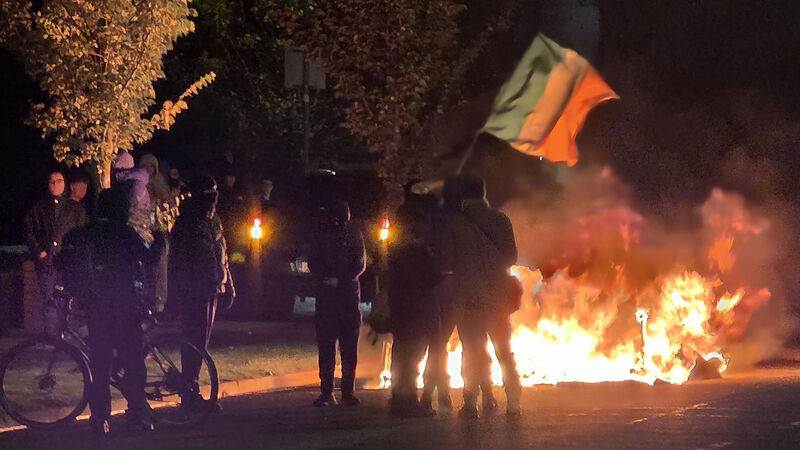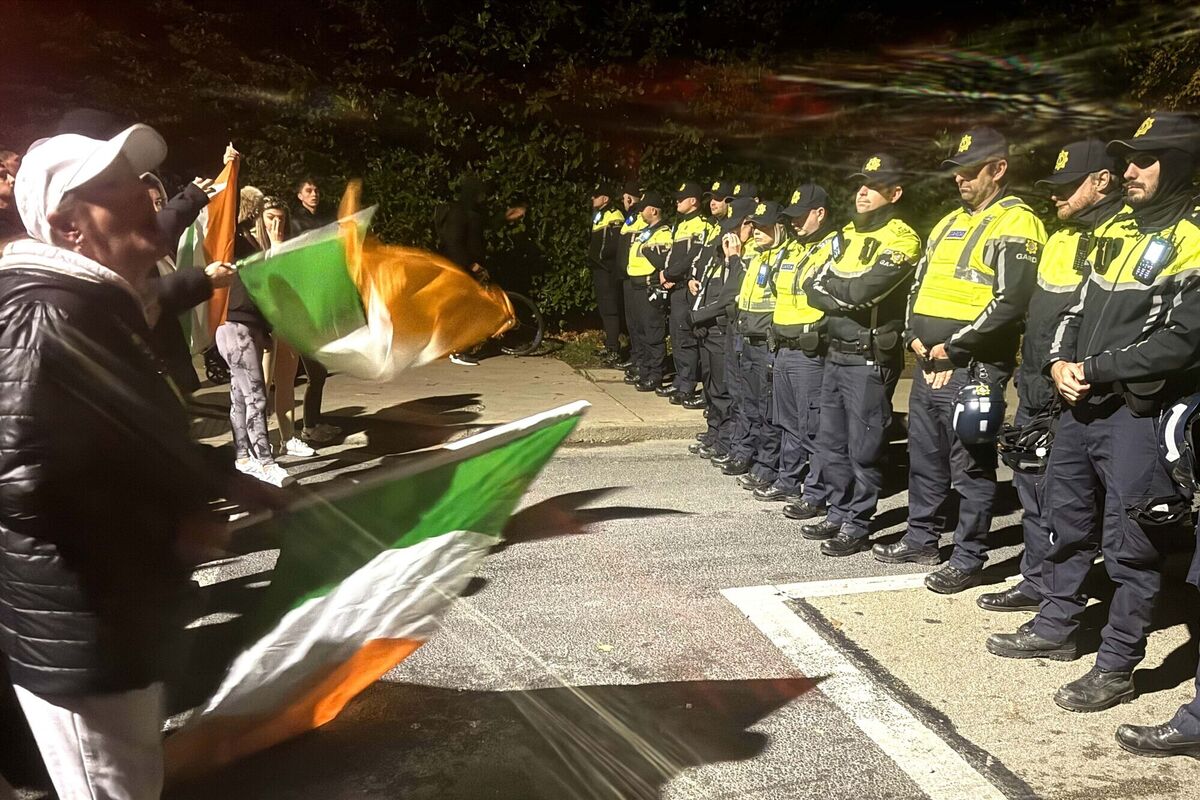Mick Clifford: Let's talk about immigration — but let's do it using facts

Rioters in Tallaght in the wake of an alleged sexual assault of a 10-year-old girl. Picture: Colin Keegan, Collins, Dublin.
We need to talk about immigration. So goes the refrain in the wake of a shocking incident outside an IPAS centre in west Dublin. A 26-year-old man, who was refused an international protection application, has been charged with the sexual assault of a 10-year-old. The victim had been in care and absconded last weekend. The alleged incident occurred on Sunday night in the vicinity of the Citywest complex in Saggart.
For some people this incident of human trauma was treated as a major opportunity. It provided the perfect platform to disseminate their favourite conspiracy theories and lies on social media, to suggest the country is falling apart.
By Tuesday, crowds assembled to protest turned into a baying mob, firing missiles and attacking gardaí at the entrance to the centre. Many of those who had organised the crowd claimed to be motivated for the welfare and protection of children.
Around 1,000 of the 1,200 occupants in the Citywest complex are members of families, including hundreds of children. Some of these children are traumatised from violence, war and displacement shattering their young lives.
The heroes outside, organising the mob, have no interest in these children, or their vulnerabilities and fears. Certainly the violent protestors didn’t think of the children as what they might term “Irish children”. Still, we need to talk about immigration.

The events since last Sunday have prompted some to cast the State as a basket case where immigration is out of control. These people claim that they represent huge multitudes who are excluded from our democracy.
One example was a tweet from John McGuirk, the editor of Gript.ie. The website features an inordinate amount of material about immigration, which, it is fair to say, is exclusively cast as something to be resented and feared. Here’s John on Twitter last Tuesday.
In relation to the violence at Citywest tonight: What are people to do when the democratic system excludes them? When there is no candidate on the ballot who will say "I hear you, I am on your side" to the hundreds of thousands of people who feel immigration is a major issue? https://t.co/khaW4LaWKR
— John McGuirk (@john_mcguirk) October 21, 2025
“In relation to the violence at Citywest tonight: What are people to do when the democratic system excludes them? When there is no candidate on the ballot who will say 'I hear you, I am on your side' to the hundreds of thousands of people who feel immigration is a major issue?”
That’s an odd thing to say because in last November’s election a whole raft of candidates stood on a so-called immigration platform. None got elected. And that was no surprise as the Irish Times/RTÉ/TG4/TCD exit poll found that immigration was an important issue for only 6% of voters.
This was just ahead of climate change on 4%, and way behind housing, cost of living, health and economic stability. Where are these hundreds of thousands without a voice who didn’t bother to vote for candidates representing their views? Surely, it’s not that the capacity of social media to exaggerate and inflate gives the false impression of voiceless multitudes out there.
Still, we need to talk about immigration because, we are told, the multitudes feel silenced.
On Tuesday in the Dáil, Independent TD Michael Fitzmaurice determined that he was not going to be silenced. Fitzmaurice doesn’t habitually dog whistle but his contribution gives a hint as to why any conversation about immigration is not what it seems.
Fitzmaurice told the Dáil that when he talks to ordinary people, pensioners and others, they are annoyed that they can’t express genuine fears about immigration, telling him, “sure what can you say, you’ll be called a racist if you open your mouth.” Then he had this to say: “Over the last year or eighteen months, unfortunately in this country, we have seen a huge upsurge in knife crime, in weapons being wielded that we haven’t seen before. We have seen some cultures that treat women as second class citizens which is not acceptable.”

Quite obviously, the TD is inferring that an upsurge in knife crime is attributable in some, unspecified way, to immigration. People watching or listening, and particularly those who are elderly, might be afraid that their safety is being compromised, their way of life attacked, by these knife-wielding immigrants.
According to An Garda Siochána, there has been no upsurge in knife crime. A report issued by AGS in September stated there has been a fall in robberies involving knifes in the past five years and a “slight increase” in assaults with knives.
Most knife crimes, the report states, occur in a domestic setting. Nowhere in the report is there any reference to immigrants or immigration in connection with knife crime. The report also notes that figures “show Ireland has recorded a 7% reduction in crime (comparing 2024 to 2019) while undergoing a 9.3% increase in population since 2019”. You won’t hear that statistic from those who bang on about a country out of control from immigration and crime.
Is Fitzmaurice's baseless assertions inferring immigrants are responsible for some phantom increase in knife crime, the kind of issue he feels people are afraid to talk about?
Ok, let’s talk about immigration. There has been a lot of it into this country over the last decade, due primarily to servicing the economy and providing services but also because of the war in Ukraine. The bulk of those arriving are from European countries, who can come and go as they please within the EU. Another cohort are here through work visas. And then the smallest cohort, usually around 10-15%, of arrivals are international protection applicants.
This year, according to the minister for justice, there has been a 40% drop in the number of international protection applicants. Strangely, those who bang on ceaselessly about immigration are not rejoicing in that last stat as a signal that things are being tightened up. Good news, as it might be termed, is no good if your objective is to pander to, or incite, anger, fear and resentment about immigration.
There are challenges with the international protection system, as there are with many elements of governing. Some of these problems are down to political cowardice. Others are due to poor management and more again are connected with external, often transient, factors. The war in Ukraine and covid exacerbated the situation, but none of it is an issue of such magnitude that it threatens anything. Certainly, that is the verdict of the vast, vast majority who voted in last November’s general election.
We should talk about immigration. We should discuss how it has changed the country, where that has been positive and if any negative aspects might be addressed. We could examine how we want things to progress in the future, when a large cohort of immigrants will be required to work in order to fund everybody’s pensions. Do some of those bursting to talk about immigration want the economy to contract and living standards, apart from their own, to fall?
We could talk about how we as a country now treat immigrants and how that stacks up against how we like to portray ourselves. We could talk about all these things but that’s not what the self proclaimed tribunes of the silent masses want. Instead, their fervent wish is for a larger platform beyond social media to spread their muck. Once we recognise and expose their warped agenda, we can talk plenty about immigration.






